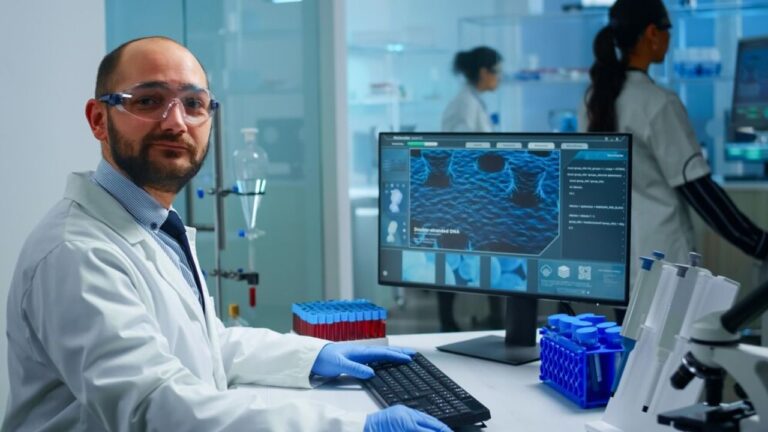Introduction
In the modern world, data science is at the heart of innovation across industries, and healthcare is no exception. With an explosion of data from various sources, laboratories and diagnostic facilities are turning to data science as a means to enhance patient care and operational efficiency. But what exactly is the role of data science in diagnostics and laboratories, and how can it revolutionize the way we approach healthcare? In this post, we’ll explore the relevance of data science in these fields, its applications, and the promising future it holds for healthcare providers and patients alike.
The Basics of Data Science in Healthcare
What is data science in diagnisic and laboratory involves using algorithms, data analysis, and machine learning to extract meaningful insights from data. In the healthcare sector, data science helps in analyzing clinical data, patient records, and even genetic information to make informed decisions. Its application in diagnostics and laboratories enables professionals to identify patterns, predict outcomes, and streamline processes.
Evolution of Data Science in Diagnostics
Over the past decade, data science has transformed diagnostics from a traditional practice to a data-driven discipline. Historically, diagnostics relied heavily on the manual interpretation of test results. Today, data science tools can process vast amounts of information quickly and accurately. This shift not only speeds up the diagnostic process but also enhances the accuracy of results, leading to better patient outcomes.
Implementing Data Science in Laboratories
Laboratories are a critical component of the healthcare system. With data science, labs can automate processes such as sample analysis and data entry, reducing human error and increasing efficiency. For example, machine learning algorithms can analyze lab results, compare them against extensive databases, and provide accurate interpretations—all in a fraction of the time it would take a human technician.
Enhancing Accuracy with Predictive Analytics
Predictive analytics, a subset of data science, plays a crucial role in diagnostics and laboratories. By analyzing historical data, predictive models can forecast trends and potential health risks. For instance, if a patient’s data indicates a higher likelihood of developing a specific disease, early intervention strategies can be employed, improving the chances of a favorable outcome.
Big Data’s Impact on Diagnostics
Big data refers to the massive volumes of data generated by healthcare facilities. In diagnostics, big data can uncover new insights by analyzing complex datasets from sources such as electronic health records and medical imaging. Through data science, this information can be harnessed to identify trends, optimize resources, and improve patient care.
Machine Learning in Diagnostic Imaging
Machine learning, a branch of artificial intelligence, is revolutionizing diagnostic imaging. Algorithms capable of “learning” from data are used to detect abnormalities in medical images, such as X-rays and MRIs, with remarkable precision. This technology not only aids radiologists but also mitigates the risk of missed diagnoses, enhancing patient safety.
Role of Data Science in Personalized Medicine
Personalized medicine tailors treatment plans to individual patients based on their unique genetic makeup and health data. Data science is the backbone of this approach, using sophisticated analytical techniques to interpret genetic information and identify the most effective treatments. This personalized approach leads to better patient outcomes and more efficient use of healthcare resources.
Addressing Challenges in Data Science Implementation
Despite its benefits, implementing data science in diagnostics and laboratories presents challenges. These include data privacy concerns, the need for standardized data formats, and the integration of new technologies with existing systems. However, ongoing advancements in data security, interoperability, and training are addressing these issues, paving the way for more widespread adoption.
Collaborative Approaches to Data Science in Healthcare
Collaboration between data scientists, healthcare professionals, and technologists is essential to fully realize the potential of data science in diagnostics. Interdisciplinary teams can leverage diverse expertise to develop innovative solutions that improve patient care and operational efficiency.
Future Trends in Data Science for Diagnostics
The future of data science in diagnostics is promising, with emerging technologies such as blockchain and the Internet of Things (IoT) set to enhance data management and connectivity. These advancements will enable more seamless data sharing and integration, further optimizing the diagnostic process.
Ethical Considerations in Data Science
With the increased reliance on data science, ethical considerations become paramount. Ensuring patient privacy, informed consent, and unbiased algorithms are critical to maintaining trust in these technologies. Continued dialogue and regulation are necessary to address these ethical challenges.
Real-World Applications of Data Science in Laboratories
Real-world examples of data science in action include automated laboratory testing, AI-driven diagnostic tools, and the development of predictive models for disease outbreaks. These applications demonstrate the tangible impact of data science on healthcare delivery and patient outcomes.
Conclusion
Data science is undeniably transforming diagnostics and laboratories, offering unprecedented opportunities to enhance patient care and operational efficiency. By leveraging advanced analytics and machine learning, healthcare providers can make more informed decisions and personalize treatment plans, ultimately improving patient outcomes. As the field continues to evolve, staying informed about the latest trends and challenges is crucial for healthcare professionals and organizations. By harnessing the power of data science, we can pave the way for a healthier future. For those wishing to explore this burgeoning field further, consider connecting with industry experts or enrolling in specialized courses to gain deeper insights.
